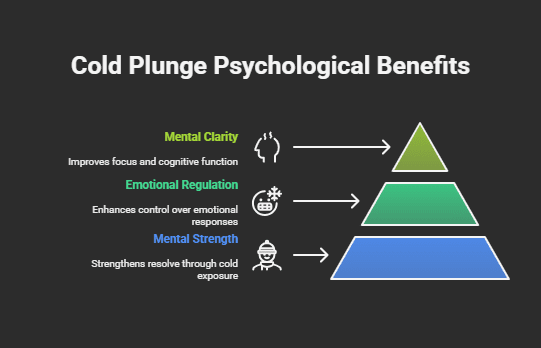The phrase “mind over muscle” perfectly sums up how cold plunges affect the mind. There is a lot of evidence for the physical benefits, but the mental strength, emotional control, and clarity are often what make the biggest difference. Cold plunges are a great way to improve your mental health, whether you’re an athlete, a busy professional, or just someone who wants to clear their mind.
The next time you’re standing there, not sure if you want to get into a cold tub, remember that every cold hug makes your mind stronger.
Cold water immersion (CWI), also known as cold plunges, is becoming popular not just with athletes but also with people who want to feel better mentally and physically. Cold plunges are said to be good for your health by everyone from professional sports teams to people who are into wellness. But there is a powerful but less well-known area beyond reducing inflammation and helping muscles heal: the psychology of cold plunges. In this article, we look at how being in cold water can have a big effect on motivation, stress relief, and how quickly you think you’re getting better.
What Are Cold Plunges?
Cold plunges are when you put your body in cold water, usually between 50°F and 59°F (10°C to 15°C), for a short time, usually between 2 and 10 minutes. This is not scary at all; it’s an old health practice based on ancient health rituals and backed up by modern science.
An Overview of the Physical Benefits:
- Decreases muscle soreness and inflammation
- Enhances circulation
- Accelerates exercise recovery
- Enhances immune response
Now let’s see what this shock to the system does to the mind.
The Psychological Effects of Cold Plunges
1. Motivation and Mental Resilience
One of the most intriguing psychological benefits of cold plunges is the way they increase motivation and mental resilience. When you get into ice water, your body’s natural fight-or-flight response is triggered. By deliberately staying in, you’re conditioning your brain to tolerate discomfort. With repetition, this develops mental toughness.
How It Works:
- Neurochemical Response: Cold exposure releases norepinephrine, a hormone and neurotransmitter that increases alertness, concentration, and mood.
- Behavioral Conditioning: Consistent cold exposure conditions the mind to cope with stress more effectively, enhancing grit and willpower in daily challenges.
Key Insight: A journal article in Medical Hypotheses observed that cold showers will be an electroshock of mild intensity to the brain, transmitting electrical impulses through peripheral nerve endings to the brain, which could lead to an anti-depressive effect.
2. Stress Reduction
Cold plunges are a great way to deal with stress. In the current fast-paced world, chronic stress is perhaps the largest health issue. Surprisingly, self-imposed cold stress can regulate and reduce overall stress levels.
Mechanisms Behind Stress Relief:
- Activates Parasympathetic Nervous System: Cold water immersion after the initial shock serves to activate the parasympathetic system, which is responsible for relaxation and recovery.
- Regulation of Cortisol: Exposure to cold assists in balancing cortisol levels, the body’s stress hormone, and thus alleviates the sense of being overwhelmed.
- Mindful Presence: The harsh cold compels you to pay complete attention to the present moment, similar to meditation or breathwork exercises.
Real-World Example: Wim Hof, colloquially referred to as “The Iceman,” has made cold immersion with breathwork popular to significantly alleviate anxiety and induce mental clarity.
3. Improved Mood and Decreased Symptoms of Depression
Another strong psychological advantage of cold plunges is their mood-boosting effect. Many users experience a euphoric sensation after immersion, commonly known as the “cold plunge high.”
Why It Occurs:
- Dopamine Release: Cold water can release dopamine by 250%, as per some studies, enhancing overall mood and drive.
- Endorphin Rush: The body releases endorphins during and after the plunge, causing feelings of pleasure and decreased pain.
Study Spotlight: A study released in the North American Journal of Medical Sciences indicates that cold hydrotherapy could be used as a possible treatment for mood disorders and depression.
4. Perceived Recovery and Confidence Boost
Most athletes and fitness professionals feel “recharged” mentally after a cold plunge. Whether the physical recovery effects are only partly placebo, the perception of recovery can make all the difference.
The Power of Perception
- Placebo Effect: If you think you’re recovering quicker, you’re more apt to go back to training with renewed energy.
- Increased Confidence: Defeating the mental hurdle of cold immersion creates a feeling of success that translates to other parts of life.
Quote from Experts: “Perceived recovery is just as important as actual recovery in optimizing performance,” states Dr. Andrew Huberman, neuroscientist at Stanford University.
How to Begin Cold Plunges Safely
If you’re new to cold plunging, it’s essential to start safely and gradually.
Step-by-Step Guide:
- Start with Cold Showers: Begin by ending your regular shower with 30 seconds of cold water.
- Short Sessions: Limit your first immersion to 2-3 minutes.
- Use a Thermometer: Ensure the water temperature is in the recommended range.
- Practice Breathing: Controlled breathing helps manage the shock response.
- Have a Warm Recovery Plan: Always warm up gradually after a plunge.
Cold Plunges and Daily Mental Toughness
Add cold plunges to your lifestyle, and it will be like lifting weights for your brain. Psychological impacts of cold plunges not only produce temporary mood elevations but also have lasting mental benefits.
How to Incorporate:
- Morning Routine: Start your morning with vigor and concentration.
- Post-Workout: Blend body and mind recuperation.
- Bad Days: Take advantage of cold immersion as a mental reset button.
Final Thoughts: Mind Over Muscle

The phrase “mind over muscle” perfectly sums up how cold plunges affect the mind. There is a lot of evidence for the physical benefits, but the mental strength, emotional control, and clarity are often what make the biggest difference. Cold plunges are a great way to improve your mental health, whether you’re an athlete, a busy professional, or just someone who wants to clear their mind.
The next time you’re standing there, not sure if you want to get into a cold tub, remember that every cold hug makes your mind stronger.
















